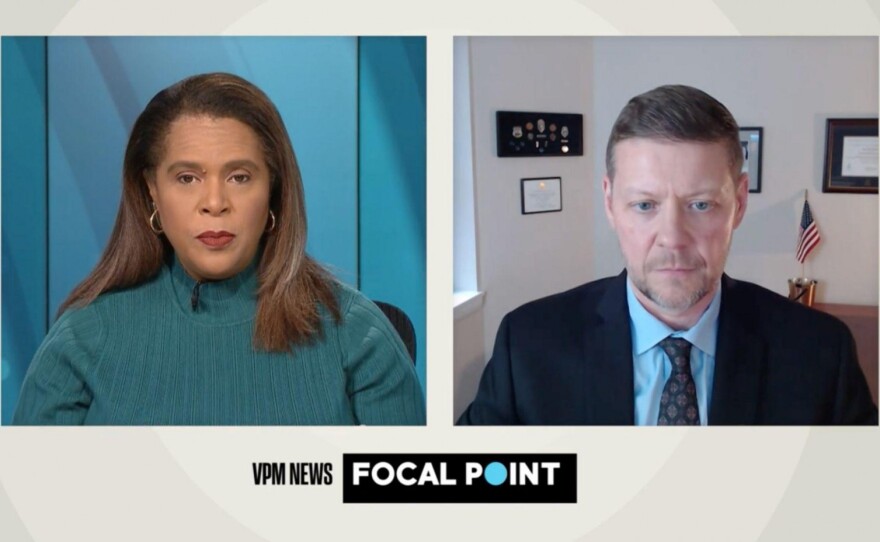About 31 percent of Americans don’t trust the police, Pew Research Center reports. What’s driving that distrust, and how can it be remedied? Adam Wojcicki of the Virginia Center for Policing Innovation shares insights and solutions.
This interview has been edited for length and clarity.
ANGIE MILES: Thirty-one percent of Americans have little to no trust in police officers, a 2021 Pew Research Center poll found. What’s driving that distrust, and how can precincts statewide rehabilitate relations with their communities? Adam Wojcicki of the Virginia Center for Policing Innovation joins us now to weigh in. Welcome, Adam.
ADAM WOJCICKI: Thanks for having me, Angie.
ANGIE MILES: So, I'm going to start with two things that put you way ahead of other guests. One is that on your bio page, there's a quote from E.B. White. And as a book lover, I find that fantastic. You also live in one of the greatest places on God's green earth, Powhatan, which is my hometown. So, so I'm glad to see those two things.
ADAM WOJCICKI: Well, thank you. And it's great to talk to someone from Powhatan who loves reading as well.
ANGIE MILES: We really do want to know what you are doing to help this very serious situation we're facing in the country right now, with … people not trusting police.
ADAM WOJCICKI: When we hear that statistic, it's very disheartening. You know, ideally, we would want our communities to have full trust in law enforcement and the police. So for us, when we when we hear that, we understand that there needs to be kind of a refocus on the idea of community policing. And that really is a framework that will help to bridge that gap of between the people that want effective law enforcement, and the law enforcement officers that want to provide it.
ANGIE MILES: One of the things that I hear from people and that I'm reading about is, what a difference mindset makes. First of all, the mindset of the public, in choosing to try to view the police as helpful. And another, the mindset of the officers as being a guardian, and not a warrior when they go out into the streets. Could you talk about that a little bit?
ADAM WOJCICKI: The importance of mindset in that relationship between the community and … police officers really starts with this idea of not just officers taking the role of guardian rather than the warrior man mentality – which is kind of an antiquated perspective, I think, in public safety. But really, it's more than that. It's this idea of a shared responsibility for public safety. So, the framework of community policing really focuses on that idea that… you can't have the police come in and … just cure a community. First of all, that's not reasonable. It's not … realistic, and nobody wants that. What the police need to do is work with the community to care for it. And that's a long-term strategy for effectiveness.
ANGIE MILES: Social media makes it immediate and viral when there is an incident of police brutality, or potential police brutality. And I think that has, you know, a really negative effect on people's perceptions of police officers. How does training impact, [lower] the number of incidents like that, that we see?
ADAM WOJCICKI: The very first thing that all of us need to agree on is that it is not acceptable. There is no excuse, there is no explanation [for] police officers behaving badly. And I know … that's a sentiment that's… widely held in the agencies and [in] the officers here in the Commonwealth. And I'm proud to say that. So, once we acknowledge that, and that needs to be said first. The next thing we can look at is … what can we do to make sure that there aren't any systemic problems or issues? What can we do to make sure that those incidents are limited? …The effort has to be constant and consistent to make sure that we're providing the best services possible to our communities. And you mentioned training. That is perhaps one of … the most important blocks in … getting to that place of effective public safety.
ANGIE MILES: Training and integrity: there are a number of people who feel that people who like to engage in violence or who want more power gravitate towards police departments, when perhaps they don't have the integrity that it takes to truly serve all of the people and to do it fairly and wisely. How does training or how does the process of choosing officers help to decrease the [public’s] concern or the or the need to be worried about integrity issues when it comes to policing?
ADAM WOJCICKI: Effective policing is requires … a wholehearted investment on the part of communities across the Commonwealth. That means that we pay enough attention to our process for hiring, that we pay enough attention to making sure that training is something that is widely available and focused on… the issues at hand. So, there is no magic bullet, there is no easy solution. To have effective policing, it takes a huge investment of time, effort, resources, now a lot of hard work on the part of the law enforcement agencies, their leadership, but also on the part of community members. So again, it's this idea of shared relationship.
ANGIE MILES: Another challenge that many departments face is diversity. Everybody has, you know, vacancies, too many vacancies now looking for workers. But the importance of having a workforce that reflects the diversity, or the complexion of the community, is important. How are you advising departments to grapple with that problem?
ADAM WOJCICKI: The police are a reflection of the community, and to have that be the case is really vital to effective policing. So, the way to address it is to make it a priority. And to measure it …we tend to put priority on the things we measure. So, we recommend collect data be purposeful in your recruitment, be purposeful in … all aspects of training, and hiring and recruitment.
ANGIE MILES: We would like to believe that most people are drawn to law enforcement because they truly want to serve, they want to be public servants, they want to make life better for other people. And to that end … when law enforcement gets it, right, what does good policing look like?
ADAM WOJCICKI: When law enforcement gets it, right, what we end up with is communities that … have a shared sense of responsibility for public safety. And that means community policing; that's essentially these big ideas, these principles, you get to see them in play. You get to see the idea of partnerships, problem solving, not just putting band aids on issues, but actual long-term problem solving, where the police and the community work together to address root issues of problems. So we talk about partnerships and problem solving, those are pretty easy to understand. But when a police agency in the community are doing public safety, right, you notice that these agencies have this idea of organizational transformation built into their structure. All that means is that they are capable of change and officers at the street level are able to make decisions and actually engage with community members to solve … problems and to address their needs. So that to me is the epitome of effective policing, which is really community policing.
ANGIE MILES: Well, hopefully the turbulence that we've seen, the mistrust that we've seen is just a starting point for things to get better. And hopefully, a lot of departments are benefiting from the work that you're doing at the at your center, innovating for police departments. Thank you so much for joining us, Adam Wojcicki, we appreciate your time.
ADAM WOJCICKI: Thank you for having me, Angie.








